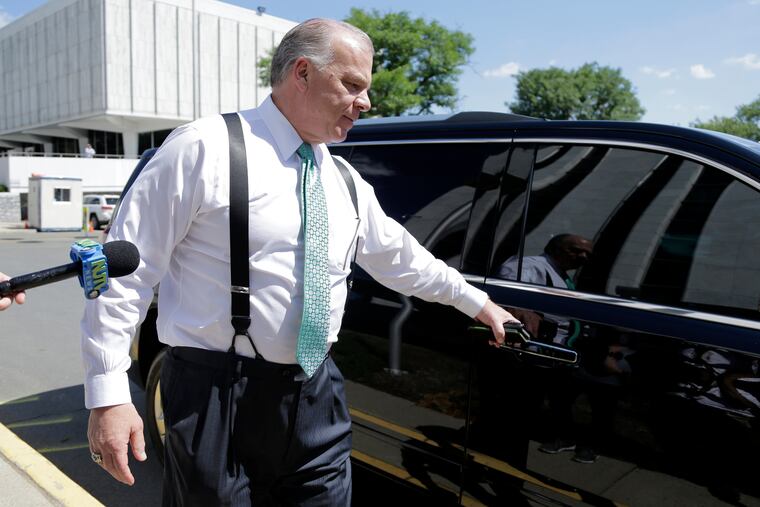N.J. nears government shutdown as Dems feud over tax hikes
Gov. Murphy and New Jersey lawmakers failed to reach a budget deal Friday, bringing state government to the brink of a possible shutdown with just one day left in the fiscal year.

TRENTON — Gov. Murphy and New Jersey lawmakers failed to reach a budget deal Friday, bringing state government to the brink of a possible shutdown with just one day left in the fiscal year.
After hours of negotiations, the governor and leaders of the Legislature, all Democrats, remained at odds over how much they should tax the wealthy.
Failure to sign a balanced budget into law by the end of the day Saturday would likely lead to a shutdown of nonessential services. That would mean the closing of state parks and beaches, racetracks, and Motor Vehicle Commission offices.
Murphy, who campaigned on a pledge to create a "stronger and fairer" New Jersey, said legislative leaders' latest proposal still did not commit the sustainable revenues he says are necessary to make a "historic investment in the middle class."
"I'm here to restore fiscal common sense to this state," Murphy, who took office in January, said at a 5 p.m. news conference outside the governor's office. "Asking millionaires and billionaires to pay their fair share is central to this."
Legislative leaders said that they had offered Murphy a proposal that would do just that, but that Murphy was too headstrong to give any ground in negotiations.
"You know Chris Christie wanted it 'my way or the highway,' too," Senate President Stephen Sweeney (D., Gloucester) said at a separate news conference Friday afternoon, referring to Murphy's Republican predecessor.
Over the last week, Murphy has repeatedly accused lawmakers of his own party of engaging in what he calls Christie-style budget gimmicks and phantom savings to balance the budget without making tough decisions.
Murphy's "behavior is exactly like Chris Christie, but he smiles more," Sweeney said.
The Legislature sent Murphy a $36.5 billion budget last week, even as the governor threatened a veto. Murphy could sign it into law, veto the whole budget or parts of it, or do nothing and declare a shutdown.
Murphy, along with Sweeney and Assembly Speaker Craig Coughlin (D., Middlesex), have spent the last week batting around ideas for new or higher taxes on everything from corporations and millionaires to short-term rentals for Jersey Shore vacationers and real estate transfers.
The chief sticking point: Murphy wants to fund his agenda by raising taxes on millionaires. Sweeney has mostly resisted a tax hike on individuals, arguing that they are already getting hit by President Trump's tax overhaul, which set a cap on a deduction claimed by 41 percent of Garden State filers.
Sweeney and Coughlin have favored a higher tax on corporations. The budget they passed is funded in part by a two-year surcharge on certain corporations, including a tax hike from 9 percent to 13 percent on corporations that earn at least $25 million. That would be the highest corporate tax rate in the country.
Murphy said the two-year window wasn't sufficient and worried that the high rate would make New Jersey less hospitable to businesses.
On Friday, the top lawmakers said they sought compromise, proposing a new 9.95 percent marginal tax rate on income above $5 million. Murphy's budget proposal, delivered in March, sought a 10.75 percent rate on income above $1 million. The current top rate, on income above $500,000, is 8.97 percent.
Lawmakers also offered to reduce their proposed corporate tax hike and extend it to four years. They also proposed more money for community colleges, a top priority for Murphy.
But the governor said their income tax proposal would protect the vast majority of millionaires in the state. "We want to invest and stand for the middle class" and working families, he said.
Sweeney countered that Murphy was "more concerned about protecting corporations that had a billion-dollar windfall from Donald Trump."
Murphy and Democratic legislators mostly agree on the spending side: They want more funding for schools, including an expansion of pre-K, NJ Transit, public workers' pensions, and other priorities.
But Murphy said this week that the budget passed by the Legislature would leave a $104 million deficit and no rainy-day fund. That's $855 million short of the closing fund balance Murphy is seeking.
Murphy wrote lawmakers earlier this week that he was "unable to certify that the revenues contained in this budget are sufficient to fund the programs we all support."